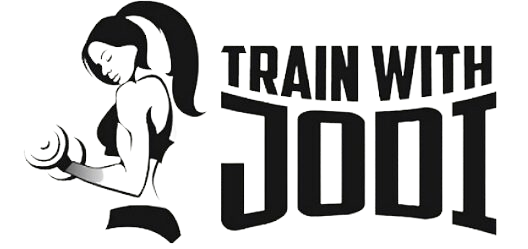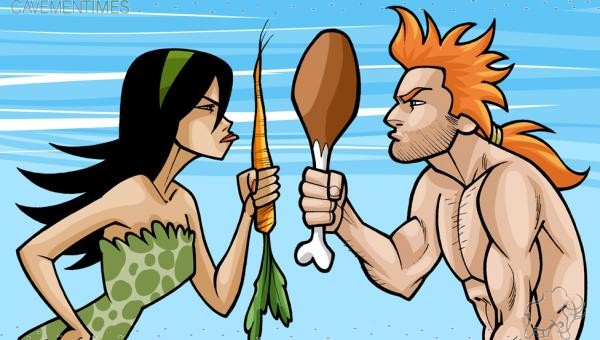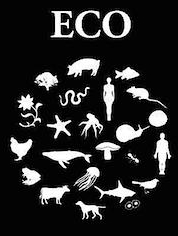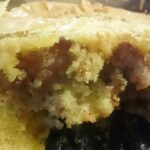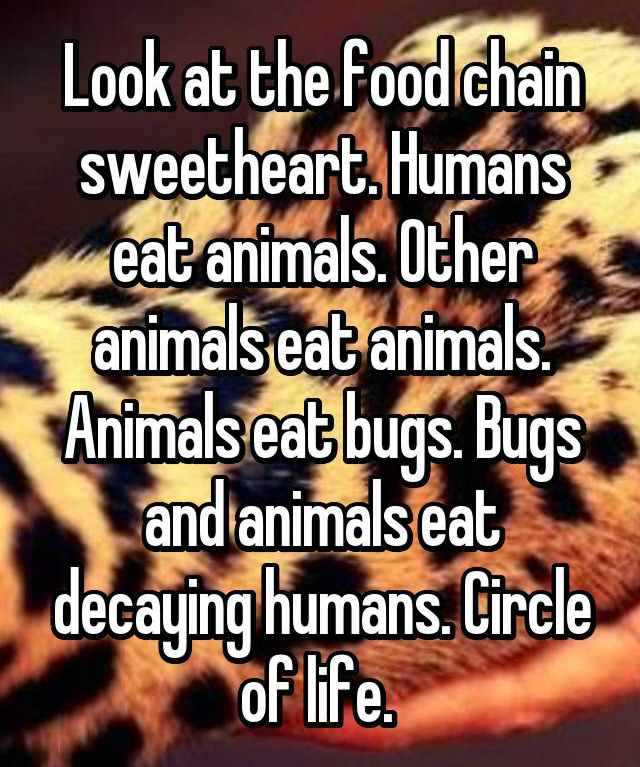
I remember when I used to be vegetarian. I did it for any and all reasons: moral, political, health and even though I thought I was correct, my body never felt good. I was hungry all the time and my body felt pretty squishy – despite my heavy lifting routine and HIT sessions. I followed Dr. McDougall’s protocol, which was zero fat, zero animals, and high complex whole grains. I spent a lot of time prepping and cooking food and snacks to eat almost every 2-3 hours because I was usually starving.
It wasn’t until I read Lierre Keith’s The Vegetarian Myth that my vegan world got turned up-side-down. It was hard to swallow and met with a bit of resistance. But as I continued reading, I started to piece together how this was not the most MORAL way to eat, was not the most ETHICAL, and was definitely not the HEALTHIEST, either. Keith had been a vegetarian for over 20 years, so she understood all my dilemmas. Here is an excerpt from her book:
This book is written not in an attempt to mock the concept of animal rights or to sneer at the people who want a gentler world. Instead, this book is an effort to honor our deepest longings for a just world. And those longings—for compassion, for sustainability, for an equitable distribution of resources—are not served by the philosophy or practice of vegetarianism. We have been led astray. We are urban industrialists, and we don’t know the origins of our food. This includes vegetarians, despite their claims to the truth. It included me, too, for twenty years.
The truth is that agriculture is the most destructive thing humans have done to the planet, and more of the same won’t save us. The truth is that agriculture requires the wholesale destruction of entire ecosystems. The truth is also that life isn’t possible without death, that no matter what you eat, someone has to die to feed you.
I want a full accounting, an accounting that goes way beyond what’s dead on your plate.
I’m asking about everything that died in the process, everything that was killed to get that food onto your plate. That’s the more radical question, and it’s the only question that will produce the truth. How many rivers were dammed and drained, how many prairies plowed and forests pulled down, how much topsoil turned to dust and blown into ghosts? I want to know about all the species—not just the individuals, but the entire species—the chinook, the bison, the grasshopper sparrows, the grey wolves. And I want more than just the number of dead and gone. I want them back.
Despite what you’ve been told, and despite the earnestness of the tellers, eating soybeans isn’t going to bring them back. Ninety-eight percent of the American prairie is gone, turned into a monocrop of annual grains. Plough cropping in Canada has destroyed 99 percent of the original humus. In fact, the disappearance of topsoil “rivals global warming as an environmental threat.” When the rainforest falls to beef, progressives are outraged, aware, ready to boycott. But our attachment to the vegetarian myth leaves us uneasy, silent, and ultimately immobilized when the culprit is wheat and the victim is the prairie. We embraced as an article of faith that vegetarianism was the way to salvation, for us, for the planet. How could it be destroying either?
We have to be willing to face the answer. What’s looming in the shadows of our ignorance and denial is a critique of civilization itself. The starting point may be what we eat, but the end is an entire way of life, a global arrangement of power, and no small measure of personal attachment to it. -Lierre Keith
The China Study – interpreted by Colin T. Campbell
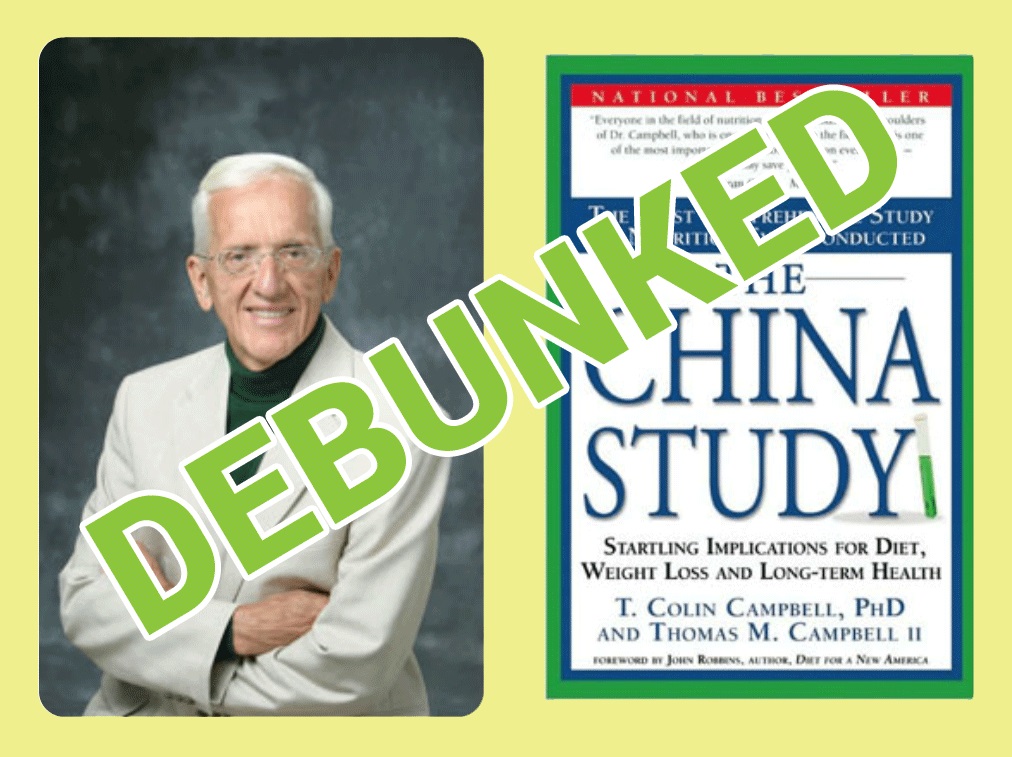
The China Study – interpreted by Colin T. Campbell was one of the largest vegetarian research studies conducted that had me convinced that I was doing the right thing (despite my appearance and how crappy I felt). However, eventually as more researchers got a hold of the raw data from the study, slowly Campbell’s interpretation started getting turned over (and rightly so).
Upon detailed analysis of the China Study, we find Campbell’s interpretation completely false and a downright intentional falsification of data. What we are left to believe is he had cherry-picked the data in an attempt to support his very own vegan agenda.
Campbell conveniently fails to mention the county of Tuoli in China. The folks in Tuoli ate 45% of their diet as fat, 134 grams of animal protein each day (twice as much as the average American), and rarely ate vegetables or other plant foods. Yet, according to the China Study data, they were extremely healthy with low rates of cancer and heart disease; healthier, in fact, than many of the counties that were nearly vegan. – Denise Minger
For the full analysis visit Denise’s breakdown here: China Study: Fact or Fallacy? She also has several other articles worth reading. There are also reviews of Denise’s article at Free the Animal, Whole Health Source, Robb Wolf and PaNu.
For another researcher’s critique, take a look here. http://www.cholesterol-and-health.com/China-Study.html
Why didn’t I put this together before?
Eating as similar to our hunter/gather ancestors solves a lot of internal cellular issues. It all starts with epigenetics and learning about what our human species has evolved eating and what daily activities would have been conducted by them. And of course, what is the most ethical and symbiotic way we can fall into the circle of life on this planet with minimal destruction. Now, I am not stating we need to do a reenactment of our paleolithic ancestors, but if we can understand their stressors, their nutritional environment, we can understand how to use those principles to benefit us in our modern society. After all, we are genetically the same as our ancestors of over 2 million years. Learning the basic principles of nutrition, exercise, and lifestyle is what makes our modern-day human bodies thrive and helps to prevent almost every disease Americans deal with. Just from switching my diet, I now dance around 10-15% body fat, naturally without trying.
The Protein Debate – Vegetarian vs. Paleo
You might also want to check out this debate between T. Colin Campbell and Loren Cordain on human protein requirements.
Protein plays a litany of roles in living systems: structural elements, peptide hormones, cell recognition, antibodies… the list is staggering and continues to grow as our understanding of biology expands. What, however, is the role of dietary protein in health and disease in humans? Is the source, type and quantity intimately and directly tied to optimal physical development and continued wellbeing? Is it causative or preventative of disease? How do we know, and how can we know? One would think this question should be straightforward and easily answered; as you will soon see the question is anything but simple! In the pages that follow, two scientists at the top of their respective fields
